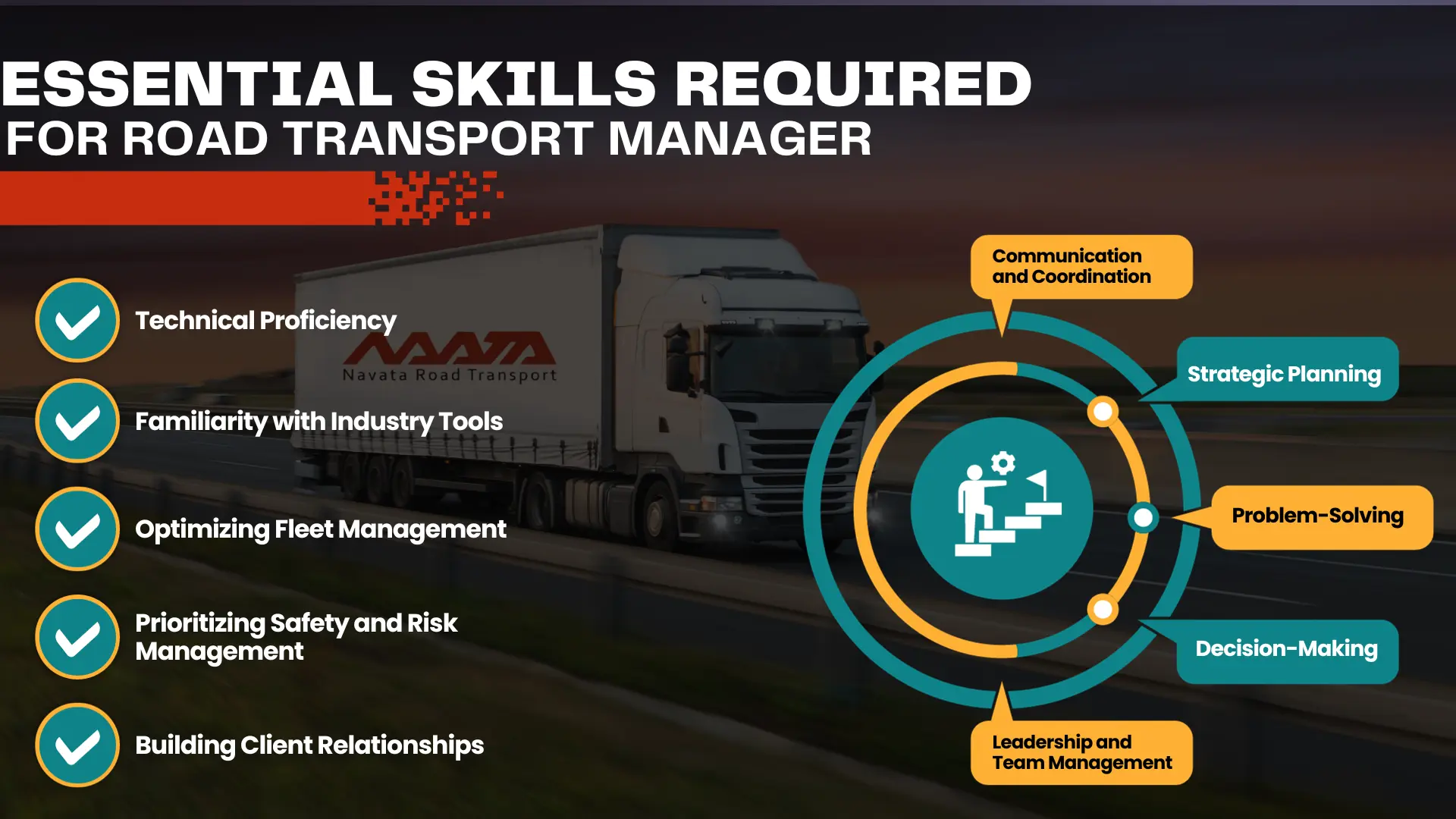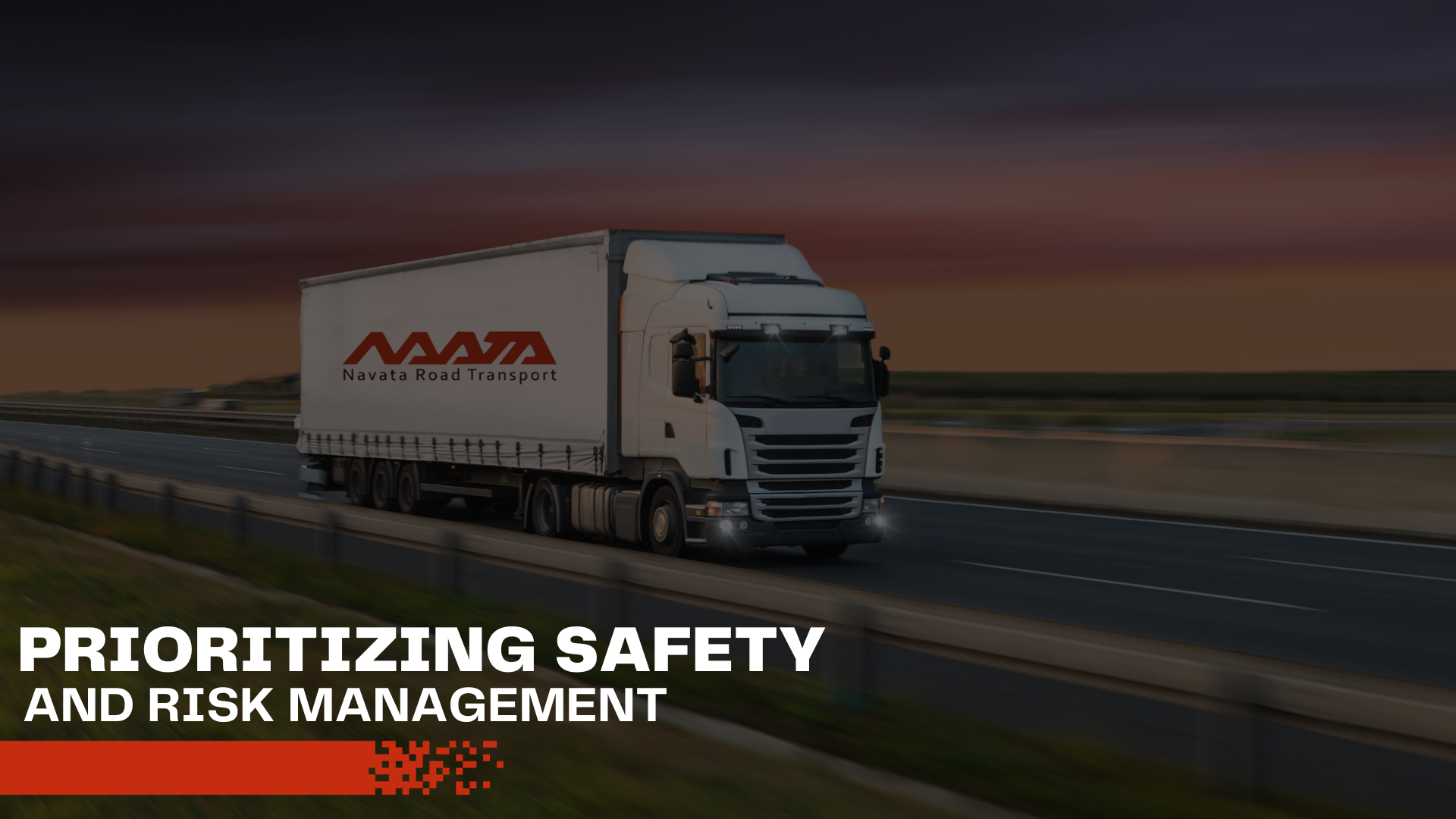How to Be a Good Road Transport Manager: Mastering the Road
Table of Contents
How to Be a Good Road Transport Manager: Mastering the Road
A road transport manager plays a critical role in the dynamic realm of transportation by assuring the uninterrupted movement of goods and services. A proficient transport manager supervises logistics and resolves intricate obstacles to maintain operations at a reasonable cost. This all-encompassing manual will examine the essential competencies, obligations, and tactics that define an outstanding road transport manager.
Understanding the Role of a Road Transport Manager
Definition and Scope
The role of a road transport manager is multifaceted, encompassing a range of responsibilities vital for the efficient movement of goods and services. A road transport manager is essentially responsible for overseeing the transportation of goods by road, ensuring that operations run smoothly, safely, and in compliance with regulations. This role extends beyond the mere act of driving; it involves strategic planning, coordination, and effective management of resources to optimize the entire transport process.
Core Responsibilities
The core responsibilities of a road transport manager are diverse and demand a comprehensive skill set. These include route planning, scheduling, and optimizing transportation processes to enhance efficiency and reduce costs. Fleet management, encompassing the maintenance of vehicles and ensuring compliance with safety standards, is another critical aspect. Additionally, a road transport manager is responsible for managing a team of drivers, overseeing their training, and implementing safety protocols to minimize risks on the road.
Importance in Supply Chain Management
The road transport manager is very important in the bigger picture of supply chain management. Transportation that works well is an important part of the supply chain because it links suppliers to manufacturers, manufacturers to distributors, and finally to the end customer.
A skilled road transport manager contributes to the overall effectiveness of the supply chain by ensuring timely deliveries, minimizing delays, and optimizing transportation costs. In essence, their role is integral to the seamless functioning of the supply chain, impacting the entire process from production to consumption. This makes their contribution invaluable to the success of the business.
You Might Also Like To Read: Logistics Manager Roles and Responsibilities : An Ultimate Guide

Essential Skills Required for Road Transport Manager
Communication and Coordination
Effective communication is the bedrock of successful road transport management. A skilled transport manager must communicate clearly to drivers, team members, and stakeholders. Coordination is equally vital, involving seamless collaboration with various departments, suppliers, and clients. This skill set ensures that everyone in the supply chain is on the same page, minimizing misunderstandings and optimizing overall efficiency.
Strategic Planning and Decision-Making
Strategic planning is a cornerstone of successful road transport management. Managers must be forward-thinking, anticipate challenges, and plan routes and schedules to optimize resources. Decisiveness is equally crucial, as road transport often involves navigating unforeseen obstacles. A competent transport manager can make informed decisions swiftly, adapting to changing circumstances to ensure that deliveries are both timely and cost-effective.
Problem-Solving in Real-Time
The road transport environment is dynamic and presents constant challenges. Transport managers must be adept at solving real-time problems, whether rerouting due to unexpected road closures, addressing vehicle breakdowns, or resolving issues with customs. The ability to think on one’s feet and implement effective solutions promptly is a hallmark of a successful road transport manager.
Technical Proficiency and Familiarity with Industry Tools
A good road transport manager must be technically proficient in an era of technological advancements. Familiarity with GPS systems, route optimization software, and other industry-specific tools is essential for efficient fleet management. Embracing and leveraging technology enhances operational efficiency and contributes to data-driven decision-making, allowing for better planning and resource allocation.
Leadership and Team Management
Leading a team of drivers and logistics staff requires strong leadership skills. A successful road transport manager inspires and motivates their team, fostering a positive and productive work environment. Effective team management involves understanding individual strengths, delegating tasks accordingly, and providing necessary training and support. By cultivating a cohesive and well-coordinated team, a transport manager contributes significantly to the overall success of the transportation operation.

Navigating Regulatory and Compliance Challenges
Overview of Transport Regulations
Road transport is subject to a myriad of regulations designed to ensure safety, environmental responsibility, and fair competition. A thorough understanding of these regulations is imperative for a road transport manager. This includes compliance with traffic laws, vehicle weight restrictions, and specific regulations governing the transportation of hazardous materials. Staying abreast of regulatory changes and updates is essential to avoid legal issues and maintain a smooth operation.
Ensuring Fleet Compliance
Compliance isn’t just for individual drivers; it’s for the whole company. Road transport company managers have to ensure that all vehicles meet safety standards, are well-kept, and are inspected regularly. Environmental standards, like rules about pollution, are also followed. Setting up a proactive maintenance schedule and using technology for real-time tracking can help fleet compliance by lowering the risk of breakdowns and keeping vehicles in great shape.
Managing Documentation and Record-Keeping
Accurate and comprehensive documentation is a cornerstone of regulatory compliance. Road transport managers are responsible for maintaining detailed records, including driver logs, maintenance records, and documentation related to cargo. This not only ensures compliance with regulations but also facilitates efficient auditing and reporting. Digital record-keeping systems can enhance accuracy and accessibility, streamlining the process of providing necessary documentation in the event of an inspection or audit. Overall, meticulous documentation is a proactive measure to mitigate risks and demonstrate adherence to regulatory requirements.

Optimizing Fleet Management
Fleet Maintenance Strategies
Maintaining a well-functioning fleet is essential for the success of road transport operations. Fleet maintenance strategies involve implementing proactive measures to prevent breakdowns and ensure the longevity of vehicles. This includes regular inspections, timely repairs, and adherence to a structured maintenance schedule. By prioritizing preventive maintenance, road transport managers can minimize downtime, reduce repair costs, and enhance the overall reliability and safety of the fleet.
Implementing Efficient Routing and Scheduling
Optimizing routes and schedules is a critical aspect of fleet management. To create efficient routes, road transport managers must consider distance, traffic conditions, and delivery deadlines. Implementing sophisticated routing software helps minimize fuel consumption, reduce transit times, and maximize the transportation process’s overall efficiency. Effective scheduling ensures that resources are utilized optimally, contributing to cost savings and improved customer satisfaction.
Embracing Technology for Tracking and Monitoring
The utilization of technology is critical in fleet management in the digital age. Road transport managers should adopt advanced tracking and monitoring systems to maintain a real-time watch on their fleet. Software for fleet management, GPS monitoring, and telematics provide invaluable information regarding the location of a vehicle, its fuel consumption, driver conduct, and maintenance requirements. By utilizing a data-driven methodology, the road transport operation can optimize its resource allocation and preventive problem-solving, and overall performance and efficiency are significantly improved.

Prioritizing Safety and Risk Management
Driver Training and Safety Protocols
The cornerstone of a safe road transport operation lies in the competence of its drivers. Road transport managers must prioritize comprehensive driver training programs that cover not only the technical aspects of driving but also emphasize safety protocols and regulations. Regular safety briefings and ongoing training sessions contribute to a safety-conscious culture. Implementing and enforcing safety protocols, such as the use of personal protective equipment and adherence to speed limits, further reduce the risk of accidents and ensure the well-being of drivers and other road users.
Emergency Response Planning
Preparing for unexpected events is a crucial aspect of road transport management. Road transport managers should develop and regularly update emergency response plans that cover a range of scenarios, including accidents, natural disasters, and vehicle breakdowns. This involves establishing clear communication channels, defining roles and responsibilities during emergencies, and conducting drills to ensure that all team members are well-prepared to respond effectively. By having a robust emergency response plan in place, road transport managers can mitigate the impact of unforeseen events and minimize disruptions to operations.
Insurance and Risk Mitigation
Road transport risk management is predicated heavily on insurance. To mitigate potential liabilities stemming from accidents, cargo damage, or other unforeseeable events, road transport managers must guarantee that their fleet is sufficiently insured. A safety culture is fostered, and the probability of incidents is diminished by implementing proactive risk mitigation strategies, including routine safety audits and compliance checks. Road transport managers can safeguard the organizational interests and maintain operational dependability and safety by proactively mitigating potential hazards and procuring suitable insurance coverage.

Building Effective Supplier and Client Relationships
Communication and Negotiation Skills
Effective communication and negotiation skills are paramount for road transport managers when interacting with both suppliers and clients. Clear and transparent communication fosters strong relationships, ensuring that expectations are well-understood and met. Negotiation skills come into play when securing favorable terms with suppliers or addressing client needs. A road transport manager with strong communication and negotiation abilities can build trust, resolve issues efficiently, and create mutually beneficial partnerships that contribute to the success of the overall supply chain.
Vendor Management
Managing relationships with suppliers is a critical aspect of road transport management. Road transport managers must develop and maintain strong connections with suppliers to ensure the timely and cost-effective availability of goods and services. This involves negotiating contracts, monitoring performance, and addressing any issues that may arise. By cultivating positive relationships with vendors, road transport managers can enhance supply chain efficiency, minimize disruptions, and create a collaborative network that supports the success of the entire logistics operation.
Customer Service Excellence
Providing exceptional customer service is essential for road transport managers dealing with clients. This goes beyond simply delivering goods on time; it involves understanding and anticipating client needs, addressing concerns proactively, and maintaining a high level of responsiveness. By prioritizing customer service excellence, road transport managers can foster long-term partnerships, secure repeat business, and enhance the reputation of the logistics operation. Satisfied clients are more likely to become loyal partners, contributing to the overall success and growth of the road transport management endeavor.
Conclusion
Becoming a proficient road transport manager requires a multifaceted approach, blending technical expertise with strong interpersonal and strategic skills. By understanding the intricacies of the role, staying abreast of industry trends, and implementing best practices, one can navigate the challenges of road transport management and contribute significantly to the success of a logistics operation. This guide serves as a roadmap for aspiring transport managers and a valuable resource for those looking to enhance their existing skills in the dynamic world of road transport.
Thanks For Reading: How to Be a Good Road Transport Manager: Mastering the Road
Powered By 360Presence




